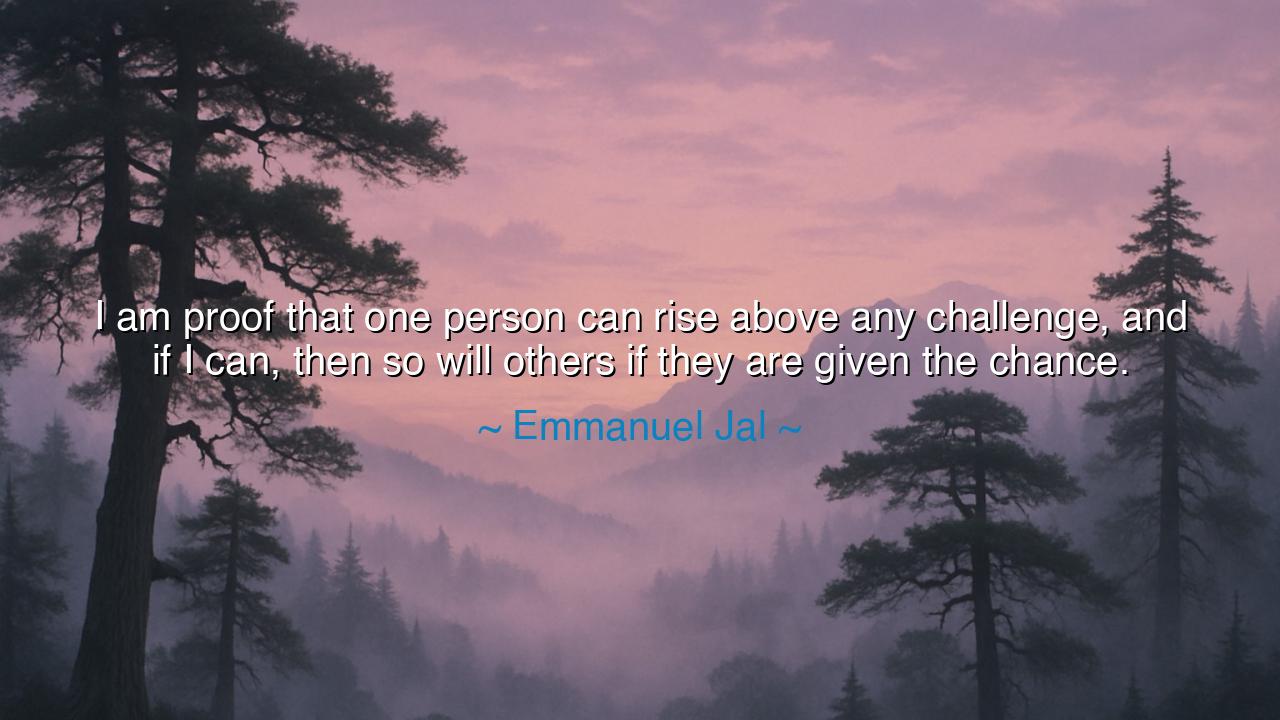
I am proof that one person can rise above any challenge, and if I
I am proof that one person can rise above any challenge, and if I can, then so will others if they are given the chance.






In the words of Emmanuel Jal, "I am proof that one person can rise above any challenge, and if I can, then so will others if they are given the chance," we hear the voice of one who has lived through adversity and emerged not just unbroken, but empowered. His statement is a testament to the strength of the human spirit, to the resilience that resides within each of us, waiting to be awakened by the trials we face. Jal’s words remind us that no matter how insurmountable the obstacles may seem, there is always the potential to rise above them. His life, marked by hardship and struggle, serves as a beacon of hope for others, proving that one individual’s triumph can be the catalyst for the empowerment of many.
Jal’s journey is a modern echo of the ancient myths and legends that tell of heroes rising from the depths of despair to achieve greatness. Like Hercules, who faced the Twelve Labors, each seemingly more difficult than the last, Jal too endured suffering—born in war-torn Sudan, enlisted as a child soldier, and stripped of the innocence of childhood. Yet, like the heroes of old, Jal chose not to be defined by the cruelty of his circumstances but instead rose above them, transforming his pain into purpose and his hardship into a message of hope. The ancient stories of Odysseus and Perseus—who overcame impossible odds to achieve their goals—mirror Jal’s own rise, for in these tales, as in his, the triumph is not just of the body, but of the mind, the will, and the heart.
The power of Jal’s quote lies in its simplicity: one person can rise above any challenge. This is not just a statement of personal victory, but a universal truth. It speaks to the inherent potential in all human beings to overcome adversity, to endure hardship, and to emerge stronger. In the ancient teachings of Confucius, we are reminded that the path to virtue and wisdom is often fraught with difficulty, yet it is through facing these trials that we are forged into better versions of ourselves. Confucius taught that one’s character is built not in times of ease, but in times of struggle. Jal, much like the great philosophers of old, shows us that growth comes from confronting life’s challenges head-on.
Consider the story of Nelson Mandela, who endured 27 years in prison under apartheid in South Africa. Like Jal, Mandela’s experience of suffering did not break him; instead, it strengthened his resolve. He became a symbol of resilience, proving that one person’s determination could inspire an entire nation to rise above its injustices. Mandela’s ability to forgive and to fight for freedom and equality showed the world that true power lies not in the ability to overpower others, but in the ability to endure and persist in the face of oppression. In the same way, Jal’s story teaches us that no matter where we begin, or what we endure, we can transform our pain into something that benefits others, if given the chance.
Jal’s statement also highlights the importance of opportunity in overcoming adversity. He doesn’t just speak of personal strength, but of the need for support, for the chances that life gives us to prove ourselves. In the ancient world, great leaders like Alexander the Great or Julius Caesar were not only shaped by their own abilities but also by the opportunities they were given to lead and achieve greatness. Alexander was not born a conqueror, but through opportunities granted by his father, King Philip II, and through his own relentless drive, he went on to reshape the world. Jal, too, emphasizes that the key to rising above challenges lies not just in one’s inner strength but in the external opportunities that allow that strength to be put to use.
The lesson Jal imparts is clear: resilience is the key to overcoming life’s challenges, but it is equally important to recognize the role that opportunity plays in our growth. While one person’s will can push them to greatness, it is the support, the guidance, and the chances given by others that allow this potential to flourish. In our own lives, we must create those opportunities—not just for ourselves but for others. We must be willing to offer a helping hand, a listening ear, and a chance for others to rise in their own time of struggle.
In the end, Emmanuel Jal’s journey teaches us the power of hope, determination, and opportunity. It reminds us that even in the face of the most harrowing adversity, the human spirit can rise, can transcend, and can create something greater from the pain. Let us remember that we all have the power to overcome, to transform our challenges, and to inspire others along the way. Opportunity, when it comes, should be seized—not just for ourselves, but to create paths for others to walk on, paths that lead to a better, more hopeful future.






AAdministratorAdministrator
Welcome, honored guests. Please leave a comment, we will respond soon